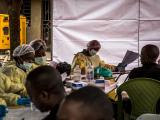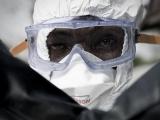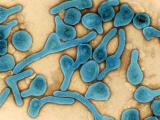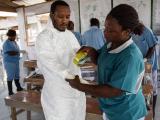Apr 22, 2005 (CIDRAP News) The World Health Organization (WHO) voiced confidence today that Marburg hemorrhagic fever in Angola can be arrested but added that health agencies are prepared to keep fighting the disease for months if necessary.
In its second statement on the epidemic in 2 days, the agency said, "WHO is optimistic that the outbreak can be controlled if present activities continue with sufficient vigour. . . . WHO and its partners are nonetheless prepared and organized to continue the outbreak response for several additional months, if this is needed." The international response to the outbreak began a month ago, on Mar 22.
The WHO also increased its count of deaths in the outbreak to match the numbers reported by news services today: 244 deaths out of 266 cases. In an update late yesterday the agency had reported 239 deaths among 266 cases. The outbreak is the largest ever for the deadly disease.
The northern province of Uige continues to bear the brunt of the epidemic, having had 253 cases with 233 deaths, the WHO said. The city of Uige has had 197 cases with 183 deaths, while other towns in the province have had 56 cases, 50 of them fatal.
The agency judges the risk of international spread of the disease to be low. No foreigners other than some who directly cared for patients have been infected. "There is no evidence that people can spread the disease before the onset of symptoms," the statement said. "Shortly after symptom onset, patients become rapidly and very visibly ill."
The severe nature of the disease has caused great fear and engendered suspicion of healthcare workers trying to contain it by taking patients away for isolation. However, "WHO staff in Uige have today reported further signs that community attitudes are improving, though hostility towards the mobile teams remains of concern in one area known to have recent cases and deaths," the statement said.
All the essential containment measures are currently being applied, with the help of more than 60 international workers and support from Angolan authorities and experts, the agency added.
In a general assessment of the outbreak, the WHO called it "an extreme test of international capacity to hold emerging diseases at bay." It made several other points:
- The case-fatality rate in this outbreak is more than 90%worse than the rate for Ebola fever, which ranges from 53% to 88%, depending on the virus strain.
- No one knows exactly how or when the outbreak started.
- Rapid detection of Marburg cases is difficult because the disease is rare and it looks like other potentially fatal infectious diseases common in the region.
See also:
Apr 22 WHO statement
http://www.who.int/csr/don/2005_04_22/en/index.html

















